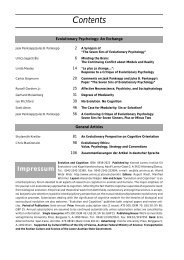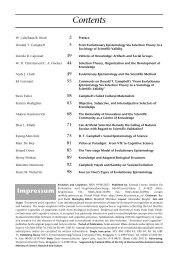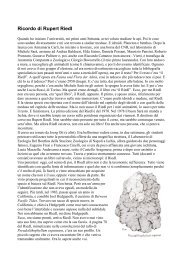Contents - Konrad Lorenz Institute
Contents - Konrad Lorenz Institute
Contents - Konrad Lorenz Institute
Create successful ePaper yourself
Turn your PDF publications into a flip-book with our unique Google optimized e-Paper software.
Some Perhaps Surprising Consequences of the Cognitive “Revolution”<br />
Key Word<br />
Decade Learning Memory<br />
L/M<br />
Ratio<br />
1900–1909 13 35 .37<br />
1910–1919 86 83 1.04<br />
1920–1929 103 117 .88<br />
1930–1930 768 249 3.08<br />
1940–1949 888 275 3.23<br />
1950–1959 1,811 1,154 1.57<br />
1960–1969 3,400 1,657 2.05<br />
1970–1979 3,458 1,867 1.85<br />
1980–1989 2,527 1,852 1.36<br />
1990–1999 2,913 2,541 1.15<br />
2000–2009 3,050 3,051 1.00<br />
Table 2. The number of publications per decade on each of the<br />
key topics of learning and memory. This search was restricted to<br />
the historically more “scientific” journals (see text for the full<br />
list). The figures for 2000–2009 are projections based on the<br />
assumption that the rate of publications for the early years of<br />
this decade will continue throughout it. The L/M ratio is the<br />
proportion of articles on “memory” relative to the number<br />
published on “learning.”<br />
Evolution<br />
Decade All Journals<br />
“Scientific”<br />
Journals<br />
1900–1909 171 14<br />
1910–1919 180 21<br />
1920–1929 908 12<br />
1930–1939 857 23<br />
1940–1949 212 6<br />
1950–1959 271 7<br />
1960–1969 897 9<br />
1970–1979 1,466 19<br />
1980–1989 3,596 44<br />
1990–1999 7,774 50<br />
2000–2009 11,009 94<br />
Table 3.The number of publications per decade in the key<br />
area of evolution. The column marked “All journals” used a<br />
full-scan search (PsychINFO), the other used only those “scientific”<br />
journals noted in the text. The figures for 2000–2009<br />
are projections based on the assumption that the rate of publications<br />
for the early years of this decade will continue<br />
throughout it.<br />
learning and memory and the right-most column of<br />
Table 3 for evolution. The journals included in this<br />
scan are:<br />
1. Journal of Experimental Psychology (including<br />
the several spin-off sub-journals established as<br />
the need for them grew)<br />
2. Quarterly Journal of Experimental Psychology<br />
(similarly here)<br />
3. Psychological Review<br />
4. Psychological Bulletin<br />
5. Journal of Comparative and Physiological Psychology,<br />
up to the 1980s when it split into:<br />
6. Journal of Comparative Psychology and<br />
7. Behavioral Neuroscience<br />
8. Animal Learning and Behavior (beginning in the<br />
1970s)<br />
9. Journal of Human Behavior and Learning (beginning<br />
in the 1970s)<br />
10. Journal of Verbal Learning and Verbal Behavior,<br />
from the 1960s through the 1980s when it became:<br />
11. Memory and Language<br />
12. Memory and Cognition (beginning in the<br />
1970s)<br />
13. Learning and Individual Differences (beginning<br />
in the 1980s)<br />
14. Learning and Motivation (beginning in the<br />
1970s).<br />
While the issues that are of primary interest here<br />
do have considerable overlap, I want to keep them<br />
separate for the purposes of exposition. First let’s<br />
take a look at learning and its epistemic partner,<br />
memory; below we’ll examine the patterns of use surrounding<br />
the term evolution.<br />
Learning and Memory<br />
A look at the early pattern of usage of these terms is<br />
instructive. When the empiricist approach to philosophy,<br />
led by the loosely confederated group<br />
known as the British Empiricists, finally triumphed<br />
over Cartesian rationalism with its nativist leanings,<br />
a deep obligation was incurred. If you are<br />
committed to environmentalism and wish to<br />
maintain the tabula rasa assumption, even in a diluted<br />
form, you have to be able to come up with<br />
some explanation of how knowledge gets acquired.<br />
Nativism, as has often been noted, is a bit a “copout”<br />
in this regard. Nativists needn’t worry about<br />
how the mind becomes epistemically populated,<br />
they simply assume it came fully equipped on arrival.<br />
An empiricist, on the very other hand, needs to<br />
entertain some mechanism through which it is<br />
possible to understand, at least in principle, how<br />
the underlying knowledge base that drives behavior<br />
is acquired. Since behaviorists were committed<br />
to this brand of empiricism, the topic of learning<br />
became central to their enterprise. And, not surprisingly,<br />
the parallel topic of memory, which is<br />
primarily concerned with the representation of<br />
knowledge, lost ground. This pattern of shifting fo-<br />
Evolution and Cognition ❘ 107 ❘ 2003, Vol. 9, No. 2








